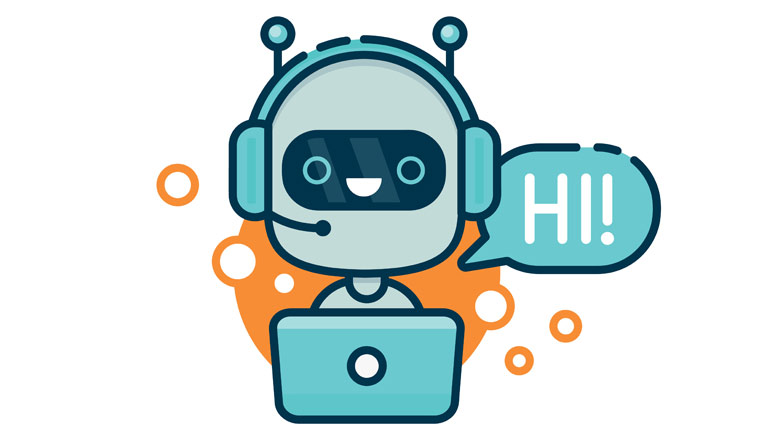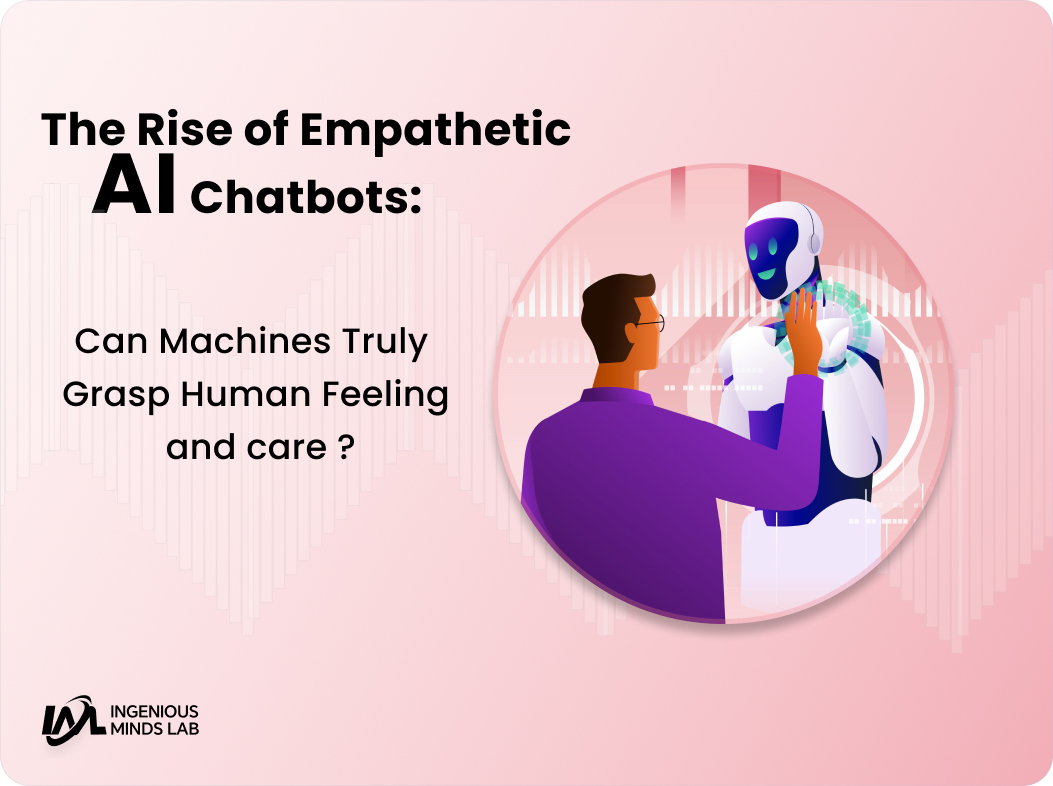As technology advances rapidly, we are witnessing the emergence of AI chatbots that possess a remarkable ability to understand and respond to human emotions. These chatbots utilize sophisticated algorithms to analyze factors like tone of voice, word choice, and even facial expressions. An example of such a chatbot is ChatGPT, developed by OpenAI, which employs natural language processing techniques to engage in seamless conversations with users. What sets these chatbots apart is their capacity to respond with empathy, acknowledging and validating human emotions. This quality makes people feel heard and valued in various ways. The potential impact of empathy-capable AI bots is significant, as it could contribute to a more compassionate and understanding society based on shared values. In this article, we will explore empathetic AI chatbots in detail, including their potential applications and any concerns they may raise.

Evolution of AI Chatbots
AI chatbots have undergone significant transformations over time, progressing through three main stages: rule-based, contextual, and empathetic. The initial stage involved rule-based chatbots, which relied on pre-programmed scripts and specific keywords to generate responses. However, these chatbots had limitations, as they couldn’t provide personalized feedback or understand the context of interactions. A notable example of this stage is ELIZA, developed in the 1960s.
The second stage introduced contextual chatbots, leveraging advanced technologies like Natural Language Processing (NLP) and Machine Learning (ML). These chatbots utilized complex frameworks to interpret natural language and engage in more natural and meaningful conversations, offering an improved user experience.
Now, in the current stage, Empathetic AI chatbots have emerged as powerful conversational tools, thanks to advanced AI technologies. These bots can accurately perceive and respond to human emotions. Unlike their predecessors, Empathetic AI Chatbot go beyond analyzing text and matching keywords. They utilize sophisticated ML algorithms to accurately analyze conversation tone and sentiment.
For instance, ChatGPT, powered by OpenAI’s cutting-edge GPT-3 technology, is capable of recognizing various emotions, such as happiness or fear, with exceptional precision. This empathetic bot can then provide customized solutions tailored to each emotion, creating a harmonious connection between humans and machines.
Benefits and Applications of Empathetic AI Chatbots
The empathy-driven features of chatbots, like ChatGPT, have diverse applications in numerous fields, showcasing their potential for significant improvements. Let’s explore some of these domains in more detail.
In the realm of customer care, businesses are already utilizing chatbots to handle common queries efficiently. However, by incorporating empathetic capabilities, these bots can go beyond scripted responses. For example, H&M’s chatbot uses machine learning to accurately understand customer queries and respond with kindness, even empathizing with frustrated customers. This approach enhances customer satisfaction by addressing their emotions while providing quick and efficient support.
Healthcare is another domain benefiting from Empathetic AI Chatbots. These bots can provide emotional support to patients during challenging times, understanding their emotions and offering comfort. In the workplace, empathetic chatbots can detect signs of stress or burnout in employees, providing proactive support and resources to improve well-being and productivity. They can also assist new hires with personalized feedback and guidance, easing the onboarding process.
In the field of education, chatbots have the potential to create tailor-made learning experiences. By understanding students’ emotions and learning styles, these bots can provide personalized assistance. For example, if a student is struggling with a concept, the chatbot can recognize their frustration and offer additional resources to help them grasp the material better.
Empathetic AI Chatbots can also address loneliness and isolation caused by age-related factors or psychological conditions by providing virtual companionship services tailored to individuals’ needs. Furthermore, they can play a crucial role in addressing mental health concerns, offering support, resources, and recommendations to users who may not be comfortable discussing such matters with human experts. Woebot, for instance, evaluates users’ moods and provides personalized advice for managing symptoms.
Additionally, chatbots can handle tasks like scheduling appointments, medication reminders, and health-related inquiries. They can also act as motivators by understanding individuals’ emotions and goals, delivering personalized support and encouragement. For example, ChatGPT can provide customized advice and motivational phrases to help individuals stay on track with their workout schedules.
The potential applications of Empathetic AI Chatbots are vast and can revolutionize various sectors, enhancing user experiences, providing support, and creating more compassionate interactions between humans and machines.
Case Study of an Empathetic AI Chatbot
Let’s explore a fictional scenario involving a character named John, who is facing mental health challenges like depression. In order to combat the stigma associated with mental health and encourage more individuals like John to seek professional help, compassionate chatbots have emerged as a valuable solution. These chatbots provide essential support and resources for managing mental health issues.
John’s experience with an Empathetic AI Chatbot for his mental health was truly remarkable. The chatbot exhibited empathy by patiently listening to John’s concerns and offering practical advice to manage his symptoms. It also provided him with resources to find a therapist, highlighting the comprehensive nature of the support it offered.
As John engaged with the chatbot, he experienced unwavering support, continuous encouragement, and meaningful conversations. This fostered a sense of trust and comfort, ultimately giving him the confidence to seek therapy. The chatbot served as a valuable companion throughout his journey, complementing his therapy sessions by providing a listening ear and guidance.
This case study exemplifies the transformative effect that Empathetic AI Chatbot can have on individuals’ well-being. ChatGPT, with its ability to recognize and respond empathetically to human emotions, plays a significant role in enhancing the overall mental health and welfare of users. By removing stigmas surrounding mental health and offering valuable support, these chatbots contribute to a more accessible and supportive mental health landscape.
How Trustworthy can empathetic AI chatbots be?
It’s natural to question whether machines can truly comprehend our emotions enough to respond appropriately, especially when AI chatbots claim to be empathetic. However, the answer lies in the technology that powers these chatbots.
For example, ChatGPT is built upon natural language processing and machine learning algorithms. These algorithms analyze text and identify patterns in human language that indicate emotions. Through continuous evolution and improvement, they enable the chatbot to provide more accurate and effective responses over time.
Moreover, the empathy displayed by ChatGPT is not superficial. It is supported by a vast knowledge of human emotions and psychology, along with extensive research on the best approaches to interact with individuals experiencing emotional distress. This knowledge base ensures that the chatbot’s responses are grounded in understanding and empathy.
Of course, skepticism regarding the genuineness of AI chatbots’ empathy is expected. However, empirical data strongly supports their effectiveness. Studies have shown that individuals sometimes feel more comfortable opening up to a chatbot than to a human therapist. This suggests that AI chatbots, like ChatGPT, not only inspire trust but also offer remarkable effectiveness in providing emotional support and guidance.
While the debate around AI chatbots’ authenticity will continue, the technology and data demonstrate that these chatbots have the potential to comprehend and respond to human emotions in a meaningful way, making them valuable resources for emotional support.
Potential Dangers of an Empathetic AI Chatbot
While the concept of Empathetic AI Chatbots is intriguing, it is important to address the potential risks associated with their use. Here are some concerns that should not be overlooked:
- Reliance on technology: One major concern is the potential for individuals to rely solely on chatbots for emotional support, replacing authentic human connections. It is crucial to remember that while chatbots like ChatGPT can provide comfort during difficult times, they should never be a substitute for genuine interactions with friends, family, or mental health professionals.
- Manipulation and malicious use: As chatbots become more sophisticated, there is a risk of malicious actors using them to manipulate people emotionally or behaviorally. It is essential to use chatbots ethically and responsibly, ensuring they are not misused as tools for harm or manipulation.
- Privacy and data security: Sharing personal information with AI-powered chatbots raises privacy concerns. Users should exercise caution when disclosing sensitive data online and only share it with trustworthy sources. While models like ChatGPT strive to prioritize user privacy, there is always a potential risk of data breaches or other security issues affecting user privacy.
Despite these challenges, Empathetic AI Chatbot technology has the potential to generate positive outcomes when implemented conscientiously and used responsibly. By prioritizing human connection and support, using the technology ethically, and being cautious about privacy and security, we can ensure that empathetic chatbots serve as a positive force for good in our lives.
Conclusion
In conclusion, the emergence of empathetic AI chatbots represents a significant advancement in technology, offering the potential to provide valuable emotional support and guidance. These chatbots, such as ChatGPT, have the ability to understand and respond to human emotions, making them powerful tools in various domains such as customer care, healthcare, education, and mental health support.
However, it is essential to approach the use of Empathetic AI Chatbots with caution. They should not replace genuine human connections and support systems. We must ensure responsible and ethical use of these chatbots, guarding against potential risks such as overreliance on technology, malicious manipulation, and privacy concerns.
By striking a balance between utilizing Empathetic AI Chatbots as a supplemental resource and prioritizing authentic human interactions, we can harness their potential benefits while mitigating potential risks. With responsible use, empathetic chatbot technology can contribute positively to society, fostering support, understanding, and well-being.

